Recycling is not the same as a zero-waste lifestyle. Read my journey in learning the difference and why you should care about it too.
I used to love telling people that my family recycled so much. Our large recycling bin is front and center in the kitchen and our smaller garbage bin lives under the sink. When there is a party with friends, I’m the one making sure to collect the plates and glasses so I could be sure to stack them together and head to the recycling bin. Even if it’s not my party. Some think I’m annoying, others have accepted my quirky behaviour and know what to expect.
I thought I was doing a great service to help the environment but it turns out, I was not helping as much as I thought. I came across author Bea Johnson giving a Tedx Talk on zero waste and what it means. And in her very first sentence she says “How many of you think we should be recycling more?” Most raised their hand. She continued by explaining it was a trick question and that she believes we should not be focusing on recycling as much as we should be focusing on creating a zero waste lifestyle.
What Can Zero-Waste Look Like?
Her talk opened my eyes. And for the record, she is not a hippy living in a hut in the woods. She is a fashionable, stylish, mama of two teenage boys and lives in a beautiful, minimalist home. Her family of four have adopted this lifestyle so well, and through her blog and book, The Zero Waste Home, she has become the guru of zero-waste life, and is educating people around the world.
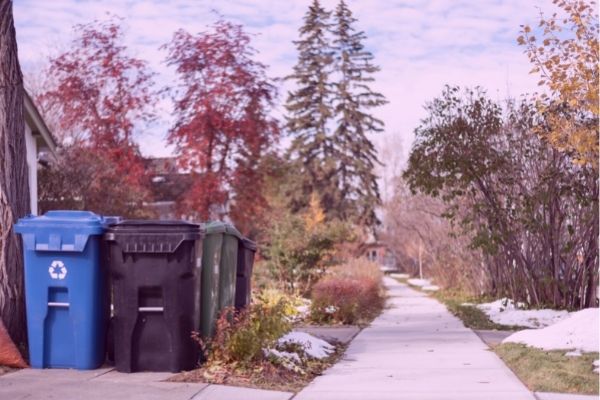
The biggest shock that got my attention was that what I thought was recyclable may not be. And the process of filtering through the waste that people deem recyclable requires so much more work and energy that is not good for the environment that it becomes counterproductive.
Learning the Truth About Recycling
When I visited Switzerland, a country that seems so advanced in so many ways, I was so surprised to see that many items were not recyclable. But that is the exact reason; they have informed their residents properly to let them know what plastics are not actually recyclable. And the reality is, many are not. For consumers, waste is easy to place in recycling bins if they are available and we might think we are doing a good job.
After getting a little disappointed with this new found knowledge, I wanted to go to another highly reputable source: DavidSuzuki.org. A national treasure of Canada, David Suzuki has been educating people around the world for decades, so I wanted to see what he had to say about recycling. Here is what I found. This video gives a lot of information in a very easy and clear way for viewers to absorb. Take a look:
So! Now that I was visibly able to see what was actually not recyclable, I was able to see that the start of a zero waste lifestyle was going to make more of an impact on the environment.
It’s not something you can change cold-turkey. And I think it would be unrealistic of me to think otherwise, with my three boys and my husband. But as the CEO of my home, and the main decision maker on items purchased, I knew there were some things I had to try my best to start implementing as soon as possible. With the list below, you may find you are already doing some of these things, just as I was.
20 Ideas for a Zero Waste Lifestyle
- Use more dish towels and rags instead of paper towels.
- Use reusable/washable dishware, cutlery and glasses at home. We love our simple white Corelle dishware.
- Go grocery shopping with reusable bags.
- When out at an event or activity, try to bring a snack when allowed/possible that limits packaging you would have when purchasing something there.
- Bring your own to-go cup when heading off to get an iced-latte (and be sure to say in advance at a drive-thru to see if it is allowed).
- Buy in bulk when possible – there are a ton of bulk stores popping up and they allow you to bring your own containers.
- If you use a lot of any one item, try seeing if there is a zero-waste alternative and make a switch. For example, I switched to reusable makeup remover pads and cotton swabs a while back.
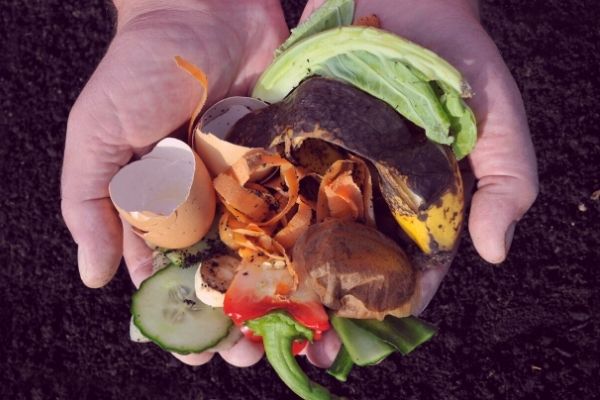 Compost! I admit, I tried this a couple of years ago and got maggots in my bin, so I gave up for a while. But now I use compost bags, and I freeze any meats that will create maggots until the day of compost pickup. You could even try composting in your own backyard.
Compost! I admit, I tried this a couple of years ago and got maggots in my bin, so I gave up for a while. But now I use compost bags, and I freeze any meats that will create maggots until the day of compost pickup. You could even try composting in your own backyard.- Use fabric napkins – this is something we have done since my husband and I were married. We even made some out of seasonal dish towels.
- Use glass or stainless steel straws – have a couple in the car for drive-thru meals or in your bag for coffee breaks. For little ones, I prefer to use silicone straws so they can’t hurt themselves on a bumpy car ride.
- Use reusable plates and glasses for parties – there are so many nice items on the market now, making it easy to have festive dishes for parties without waste.
- Find biodegradable balloons. Ask at your store – they do exist. Even bunch-o-balloons are biodegradable.
- Get to know what your city is doing to make less waste – are there programs? Workshops? Do they have recycling areas for special items?
- If you are a DIY kinda person, try making your own cleaners and cosmetic products.
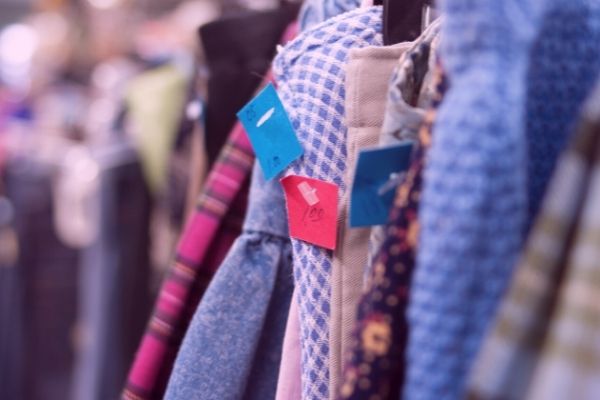 Buy second-hand clothing and other items.
Buy second-hand clothing and other items.- Do not throw out items before offering them to friends, second-hand stores, or donation organizations.
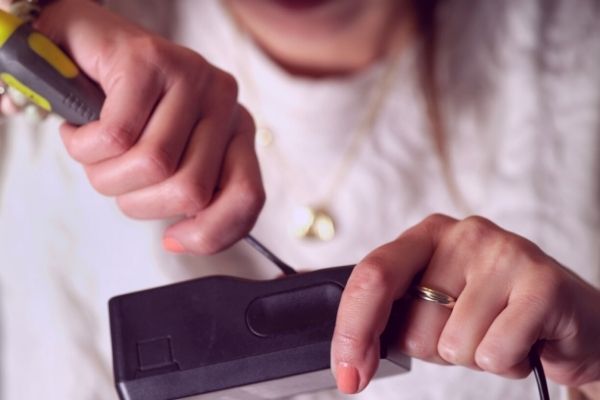 Fix things. Before you give up on an appliance or a tool, see if there is way to have it fixed before tossing it for a new one.
Fix things. Before you give up on an appliance or a tool, see if there is way to have it fixed before tossing it for a new one.- Buy produce at your local market – you will be helping local farmers, plus you won’t have unnecessary additional packaging. We are big fans of Lufa Farms. Their weekly service has been invaluable to us.
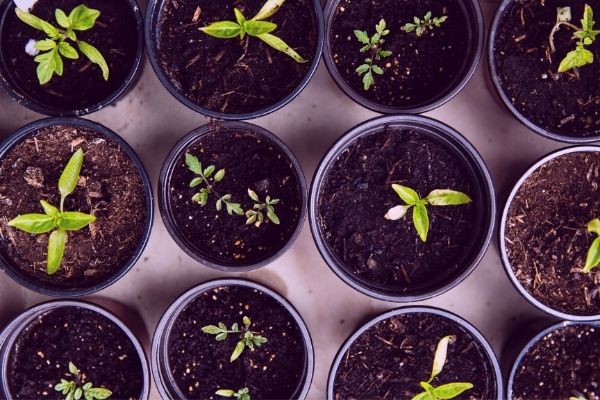 Start a garden at home. You don’t need a load of space, or even a backyard. There are lots of options. Harvesting your own produce eliminates any wrapping from a grocery store pick up.
Start a garden at home. You don’t need a load of space, or even a backyard. There are lots of options. Harvesting your own produce eliminates any wrapping from a grocery store pick up.- Do not buy bottled water! In Canada, there is no need to purchase water in a bottle. If you are concerned about the water quality, as I was, consider investing in a filter system like Zero Water instead. Then make sure you have a reusable bottle and fill it up before you leave the home.
Chances are, you are already doing some of these things. And with this long list, it will be easy to implement another few in the next month or year. Then before you know it, you are living a better lifestyle for you, your family, and the environment.
In a report done analyzing the waste of Canadians, an estimated 4.4 pounds of trash is created per person per day – that is crazy. With landfills reaching their capacity, the only route is to live a more sustainable life.
For more information on Bea Johnson, visit her blog. And if you have teens and young adults in your family, Lauren Singer is another fantastic source and Shelbizlee has a super YouTube channel.
If you enjoyed this post, then be sure to check out these articles:
Starting School in an Eco-Friendly Way
Spring Cleaning with Green Works
What ways are you already living a zero-waste lifestyle and what ways are you considering living an even more sustainable life?
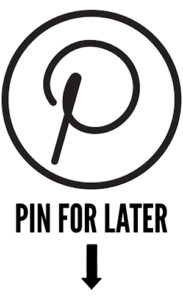
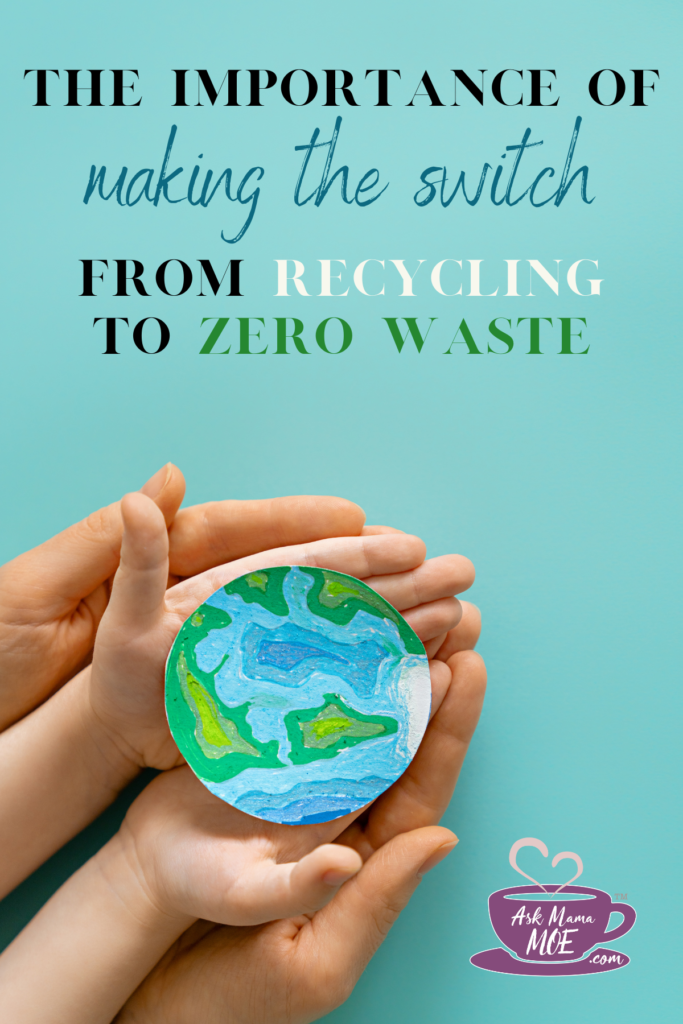


1 comment
Great blog! I have also recently learned more about the zero waste lifestyle and have made some of the changes you mention above. Another easy switch is to use the reusable coffee filter rather that disposable filters ( big coffee drinker here!). Also, eco friendly stores also sell wool balls to use in your dryer instead of disposable sheets. They last approximately two years and you can add some scent extract if you like that fresh smell on your clothes. All these horrible videos showing marine life suffering with plastic all around them usually include that recognizance laundry detergent container. How many of those do we throw out in a lifetime? I have recently started taking mine to the eco friendly store where they refill my laundry and dishwashing liquid. As someone who loves to sew, i had accumulated way too much fabric I would never use. I started making my own laundry and cleaning rags, and have many away to friends and colleagues. Less paper towel being used and disposed of! I also made my own eye makeup remover pads a year ago, and now make sets for others. How about eliminating shampoo and conditioner bottles? They have very good refillable alternatives now, as well as both available in bar form. The reduction in the use of single use plastics is very manageable for people, they just need to become sensitized to the problem and aware of the alternatives! Thanks for highlighting the issue and good luck